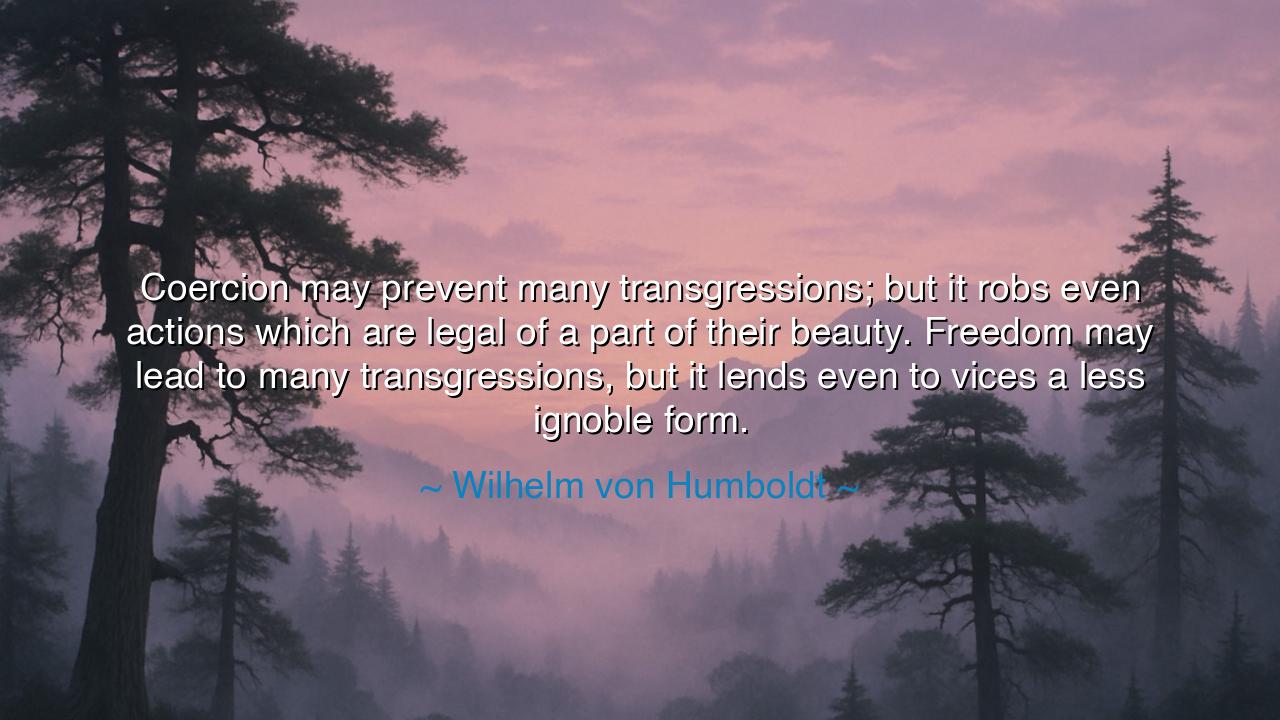
Coercion may prevent many transgressions; but it robs even
Coercion may prevent many transgressions; but it robs even actions which are legal of a part of their beauty. Freedom may lead to many transgressions, but it lends even to vices a less ignoble form.






Hear, O seeker, the solemn words of Wilhelm von Humboldt: “Coercion may prevent many transgressions; but it robs even actions which are legal of a part of their beauty. Freedom may lead to many transgressions, but it lends even to vices a less ignoble form.” This is no idle reflection of a passing age, but a timeless truth, borne upon the wings of wisdom from the hearts of philosophers who sought to understand the balance between law, liberty, and the spirit of man.
Behold the nature of coercion: it is the iron hand of authority, the chain that restrains the will, the force that bends the soul not through persuasion but through fear. Yes, it may restrain the wicked, and yes, it may prevent the rash from plunging into folly. Yet in its shadow even the noblest deeds lose their radiance, for what beauty lies in a gift offered by command? What virtue can be claimed by one who acts not out of choice, but out of compulsion? The flower that blooms in the wild field has majesty; the flower forced in a cage of iron loses its fragrance.
Consider now the realm of freedom: it is the breath of life, the spark of dignity within the human heart. It permits error, yes; it permits even vices, for men are frail and passions strong. Yet in freedom, even sin bears a mark of humanity. The drunkard in liberty is not the same as the man who obeys without thought; the one errs as a free soul who may yet rise, while the other, though obedient, is but a shadow cast by the will of another. Thus Humboldt proclaims that freedom, though it allows stumbling, preserves the grandeur of the human spirit, while coercion, though it prevents the stumble, makes even upright walking a thing diminished.
Recall, children of wisdom, the story of Socrates in ancient Athens. He stood accused by the city, condemned to drink the hemlock. Yet he chose freely to obey the law, not because of force, but because of conviction. His death was not stripped of beauty, for it arose from his own embrace of duty and truth. Had he been dragged in chains, compelled against his will, the act would have lost its nobility. In his freedom, even in facing death, his choice bore a form far less ignoble than coerced obedience ever could.
Mark also the lessons of tyrants throughout history: when men are compelled to act, they may comply, but their souls grow weary and their hearts grow false. Under coercion, hypocrisy thrives, for men learn to speak what is demanded, but not what is true. Yet when men walk in freedom, their flaws are visible, but so too are their virtues genuine. For the honest mistake of a free man is more sacred than the flawless obedience of one enslaved.
Therefore, the lesson is clear: guard your soul against the easy call of coercion. Do not delight in restraining others through force, nor think that virtue can be commanded. Seek instead to persuade, to inspire, to awaken in others the will to act nobly of their own accord. For in such freedom, the beauty of virtue shines brightest, and even failure becomes a step toward wisdom.
Practical action lies before you: when you lead, do not rule with fear, but guide with trust. When you teach, do not silence with authority, but invite with reason. When you face the faults of others, remember that their liberty to err is also their liberty to grow. And in your own heart, when faced with choice, remember that a good deed chosen freely is worth more than a hundred imposed by force.
So let it be inscribed upon your mind: coercion may restrain, but it diminishes; freedom may risk, but it ennobles. Better to stumble as a free soul than to walk perfectly as a prisoner. For only in liberty does the human spirit find its true and radiant form.






AAdministratorAdministrator
Welcome, honored guests. Please leave a comment, we will respond soon